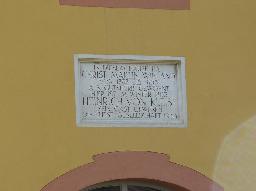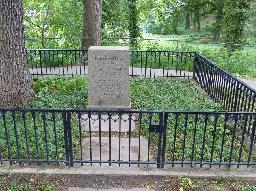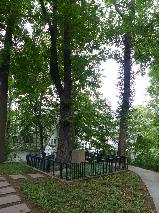Kleist, Heinrich von |
| POET (GERMANY) |
|
BORN 18 Oct 1777, Frankfurt an der Oder, Brandenburg - DIED 21 Nov 1811, Berlin-Wannsee: shore of the Kleiner Wannsee BIRTH NAME Kleist, Bernd Heinrich Wilhelm von CAUSE OF DEATH suicide by gunshot GRAVE LOCATION Berlin: Heinrich Kleist Grabstätte, Bismarckstrasse 3, Zehlendorf (Wannsee, southern shore) |
|
Heinrich von Kleist came from a noble family of officers. After his father Joachim Friedrich von Kleist died in 1788 he was raised by Samuel Heinrich Catel in Berlin. In 1792 he entered the army in Potsdam and in 1793 he was active in the war against France under Ernst von Rüchel. In 1797 he was promoted to lieutenant, but by that time he had privately started studying mathematics and philosophy. In 1799 he left the army and he entered the University of Brandenburg. Among his favourite teachers was Christian Ernst Wünsch. In 1799 he became engaged to Wilhelmine von Zenge, the daughter of a general. Her family insisted that he should work for the state and he abrupty aborted his studies in 1800 to enter into the service of Prussia. But early in 1802 he settled in Switzerland because he wanted to live near to nature and there he met Heinrich Zschokke and Ludwig Wieland (the son of C.M. Wieland). His engagement came to an end because Wilhelmine didn't want to live like a farmer. In the autumn of 1802 he visited Wieland at his estate Ossmannstedt near Weimar and he also met Goethe and Schiller. He decided to be a poet and returned to Germany. In Dresden he met Friedrich de la Motte Fouqué and his childhood friend Ernst von Pfuel. After a stay in Paris he applied for a job with the government in Berlin and for a while he worked in Königsberg. There he saw Wilhelmine again. She was now the wife of Wilhelm Traugott Krug, a professor in philosophy. In Königsberg he finished his comedy "Der zerbrochne Krug" (1808, "The Broken Jug"). In 1807 he wanted to leave State service but on his way to Berlin he was arrested by the French authorities who consiered him to be a spy. He was imprisoned at Châlons-sur-Marne and there he wrote his story "Die Marquise von O....". After his release he returned to Dresden where he knew C.G. Körner, Ludwig Tieck and Caspar David Friedrich. In December 1808 he completed his drama "Die Hermannsschlacht". He travelled to Prague in 1809 to start a publication in favour of German liberty, but nothing came of it. In 1809 he returned to Berlin once more. His "Das Käthchen von Heilbronn" was published in 1810 but Iffland, the director of theatre in Berlin, refused to stage it. His poverty and his lack of literary success depressed him and he started thinking of suicide. In 1809 he had met Henriette Vogel. They became close friends but she was married. His friend Adam Müller claimed that they weren't lovers but this was possibly to protect their reputations. Henriette suffered from uterine cancer, and they decided that they would die together. At the Kleinen Wannsee in Berlin Kleist first shot Henriette and then himself. The night before they had written farewell letters and they had posted them on the day of their deaths. It was Henriette who stated that she wanted to be buried with Heinrich. They were buried at the spot where they died because suicide victims weren't allowed to be buried at cemeteries in those days. In 1936 a new gravestone was placed and in 2011 the entire gravesite was renewed to commemorate his 200th birthday. Related persons • was a friend of Dahlmann, Friedrich Christoph • met Goethe, Johann Wolfgang von • met Motte-Fouqué, Friedrich Heinrich Karl, Freiherr de la • met Schiller, Friedrich von • visited Staegemann, Elisabeth von • was a friend of Vogel, Henriette • visited Wieland, Christoph Martin |
Sources • Heinrich von Kleist - Wikipedia (DE) |





